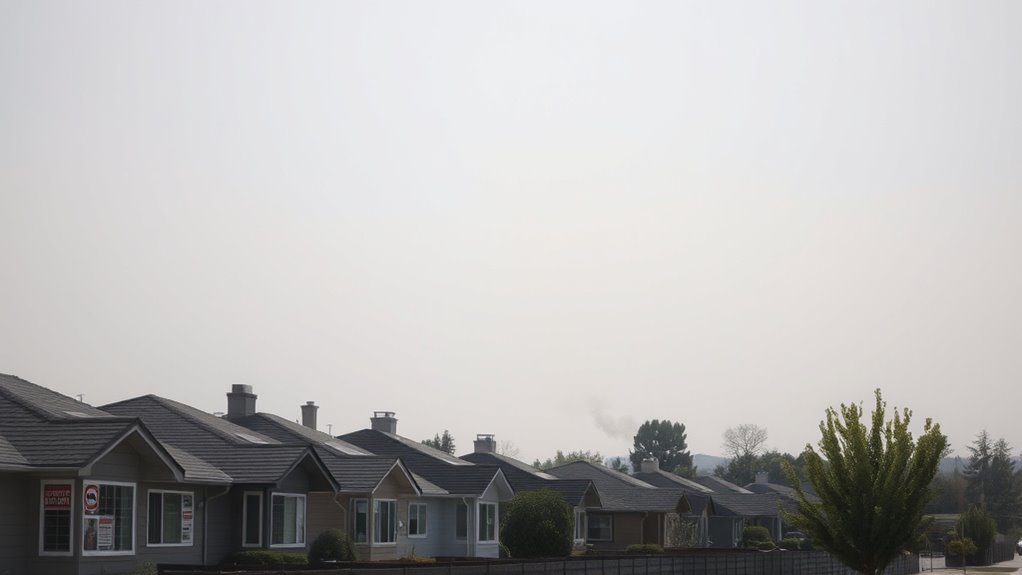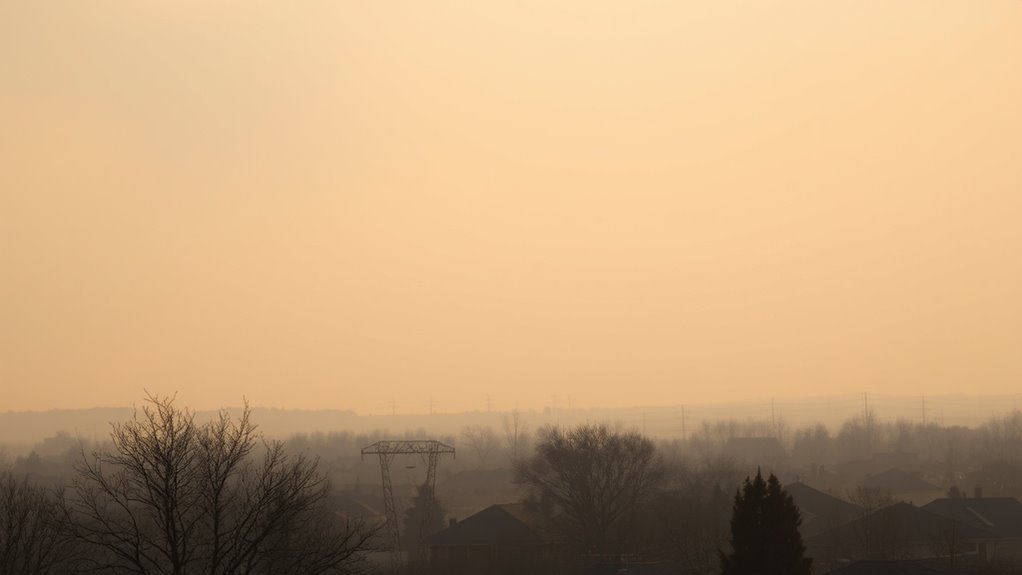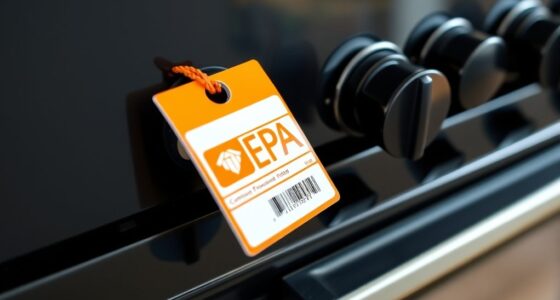Air quality burn bans mean that you can’t burn yard waste, trash, or other materials outdoors during times when air pollution levels are high. These restrictions help reduce smoke, particulate matter, and chemicals in the air, protecting your health and the environment. Ignoring these bans can result in fines and increased health risks. To learn how these measures keep your community safe and what alternatives you can use, keep exploring the details.
Key Takeaways
- Burn bans are restrictions on open fires to reduce air pollution during poor air quality conditions.
- They aim to protect public health by limiting smoke and airborne toxins.
- Burn bans help prevent wildfires and fire-related hazards in dry, windy conditions.
- They support environmental health by decreasing particulate matter release into the air.
- Violating burn bans can result in fines; alternatives include composting or proper disposal.

During periods of poor air quality, burn bans are implemented to protect public health and the environment. You might wonder what these bans mean for your daily routine, especially if you enjoy outdoor fires or rely on wood stoves. The primary goal is to reduce pollution levels caused by combustion sources, which contribute substantially to smog and unhealthy air. By limiting or prohibiting open burning, authorities aim to control pollution and safeguard vulnerable populations from airborne toxins. This is vital because smoke from fires contains particulate matter and chemicals that worsen respiratory issues, heart conditions, and other health problems. When a burn ban is in effect, it signals a need for you to pause outdoor burning activities and switch to cleaner alternatives, if possible.
Understanding the connection between fire safety and pollution control helps clarify why burn bans are so important. Fire safety isn’t just about preventing wildfires; it’s also about reducing accidental fires caused by careless burning during high-risk periods. When air quality is poor, the risk of fires getting out of control increases, especially if dry, windy conditions prevail. Implementing burn bans helps prevent these hazards, protecting both the environment and your community. It’s a proactive step that minimizes the chances of uncontrolled fires igniting due to unattended or improperly managed fires. In effect, burn bans serve as a safeguard against preventable fire incidents that could threaten lives, homes, and natural habitats. Additionally, burn bans can help reduce the release of particulate matter, which is a major contributor to air pollution. This reduction is especially important because air pollution can have immediate and long-term health impacts on vulnerable populations.
For you, adhering to burn bans is essential. Ignoring these restrictions can lead to hefty fines and, more importantly, contribute to worsening air pollution. During a burn ban, it’s advised to avoid burning yard waste, trash, or any other combustible materials. Instead, consider alternative disposal methods like composting or taking waste to designated disposal sites. This not only helps you stay compliant but also actively participates in pollution control efforts. It’s a collective responsibility—when everyone follows burn bans, the overall pollution levels decrease, improving air quality for everyone. Better air quality means healthier lungs, fewer asthma attacks, and a more comfortable environment for vulnerable populations, including children and the elderly.
Frequently Asked Questions
How Long Do Burn Bans Typically Last?
Burn bans usually last from a few days to several weeks, depending on fire safety conditions and environmental impact. You should stay updated through local authorities, as bans can be lifted or reinstated quickly. During this period, avoid burning yard waste or outdoor fires to reduce wildfire risk and protect air quality. Following these bans helps prevent wildfires and minimizes pollution, keeping your community safe and healthy.
Can I Be Fined for Burning During a Ban?
Burning during a ban can lead to fines and legal penalties, so always heed fire safety laws. If you ignore a burn ban, authorities may issue citations, confiscate equipment, or impose hefty fines. You might also face criminal charges if your actions cause a wildfire or damage property. Stay safe and compliant by respecting burn bans, because breaking these rules jeopardizes both your safety and legal standing.
Are There Exemptions for Agricultural or Emergency Burns?
You might be able to conduct agricultural exemptions or emergency burns during a burn ban, but you need to follow specific emergency burn rules. These exemptions typically allow burning for farming or urgent safety reasons, but you must apply for permits and notify authorities as required. Always check local regulations beforehand, as rules vary by area. Ignoring these exemptions can lead to fines or legal trouble, so stay informed and act responsibly.
How Do I Find Current Burn Ban Status in My Area?
You can find the current burn ban status in your area by checking local regulations through your city or county website, which often updates burn ban information regularly. Many jurisdictions also use notification methods like social media, email alerts, or local news to keep residents informed. To stay safe, make it a habit to verify burn restrictions before starting any outdoor fires, especially during high fire risk periods.
Do Burn Bans Affect Outdoor Recreational Fires?
Burn bans typically restrict outdoor recreational fires, including fire pits and campfires, to reduce air pollution. You should check current fire pit restrictions in your area before lighting a fire, as bans can prohibit them entirely. Outdoor grilling guidelines may also be affected, so verify if charcoal or wood grills are allowed during a burn ban. Always follow local regulations to stay safe and avoid penalties.
Conclusion
Understanding air quality burn bans helps you protect your health and the environment. Did you know that during high pollution days, particulate matter can increase by over 50%, worsening respiratory issues? By following burn bans, you contribute to cleaner air and reduce health risks for everyone. So next time a burn ban is in place, remember you’re playing a crucial role in improving air quality and safeguarding your community’s well-being.











